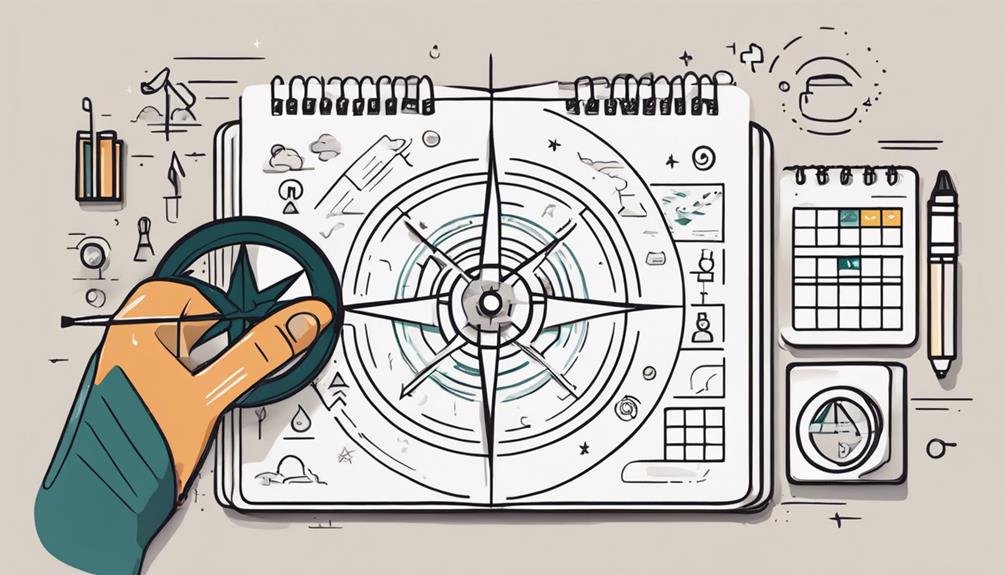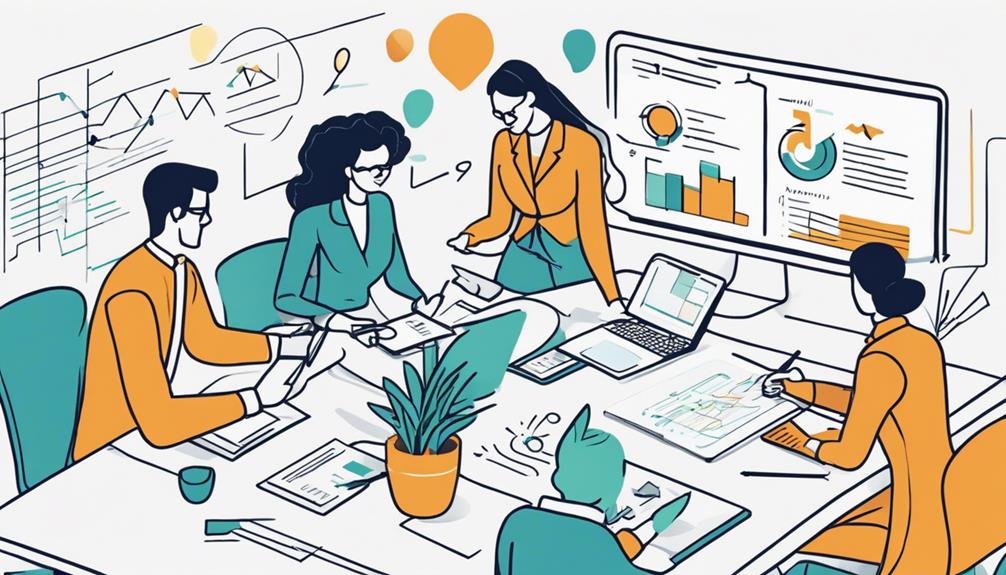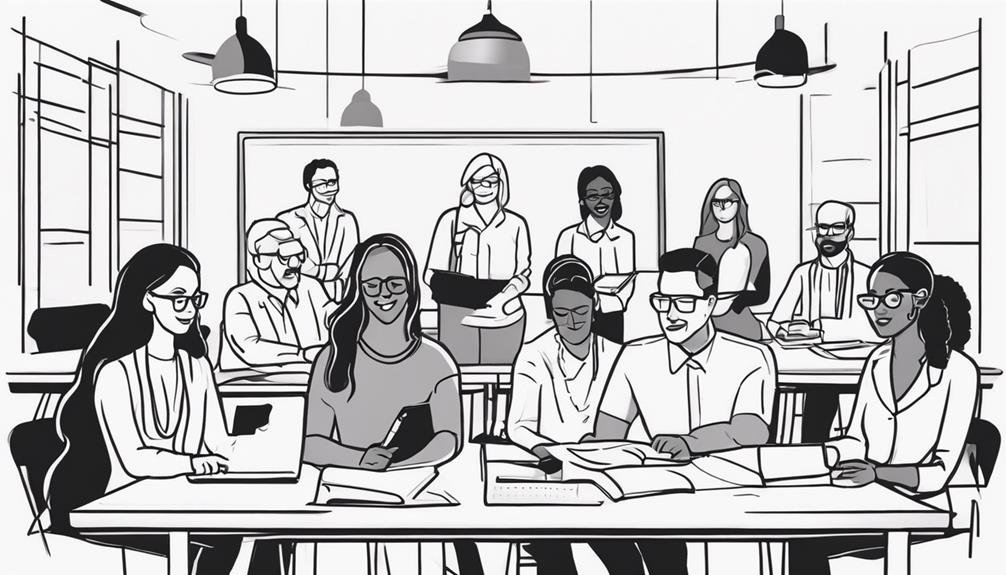Enhance your new skills by focusing on clear goal setting, seeking mentorship from experienced professionals, and cultivating motivation through defining specific objectives and celebrating achievements. Building a supportive environment, implementing effective practices, and utilizing hands-on experience will solidify your skill development. Enhancing your learning experience by seeking feedback and embracing obstacles will further boost your growth. Prioritizing teacher development and promoting educational diversity will elevate your instructional quality and foster student engagement. These ten tips offer a thorough approach to accelerating your professional growth and skill acquisition.
Key Takeaways
- Set clear, measurable goals for skill development.
- Seek mentorship to gain guidance and accelerate growth.
- Cultivate motivation by celebrating small victories.
- Build a supportive environment with encouraging individuals.
- Implement best practices and practical skill improvement strategies.
Setting Clear Goals

Setting clear objectives is pivotal in your journey to enhance your new skills. By setting specific and measurable objectives, you can focus your efforts and track your progress effectively. Measurable objectives enable you to stay motivated as you see yourself making tangible advancements. Breaking down your objectives into smaller tasks makes them more manageable and achievable, keeping you on track for success. Clear objectives not only help you identify areas that need improvement but also allow you to make steady progress towards your skill enhancement goals. Remember, having a schedule and tracking your progress are essential components of skill development and goal attainment. Stay motivated by celebrating small wins along the way and adjusting your objectives as needed to ensure continuous improvement. With clear objectives in place, you are well on your way to mastering new skills and achieving your desired level of expertise.
Seeking Mentorship
When starting on a journey to enhance your new skills, seeking mentorship can be a transformative step towards achieving your goals. Mentorship offers invaluable guidance and support from experienced professionals in your field. A mentor shares their knowledge and experiences, providing you with insights that can significantly enhance your skills and accelerate your professional development.
Engaging in mentorship not only fosters your growth but also opens doors to new opportunities for advancement. By building a relationship with a mentor, you are creating a foundation for success and satisfaction in your learning journey. The wisdom and advice shared by a mentor can help you navigate challenges more effectively, ultimately propelling you towards your goals at a faster pace.
Make the most of mentorship opportunities available to you. Embrace the chance to learn from those who have walked the path before you, and watch how their guidance can shape your skills and outlook. Seek mentorship as a potent tool in your arsenal for success and professional development.
Cultivating Motivation

Moving forward in your journey to enhance your new skills, cultivating motivation plays a pivotal role in your success. When learning a new skill, motivation can be the driving force that propels you towards mastery. Here are some tips to help you cultivate motivation:
- Set Specific Goals: Define clear, measurable objectives to keep you focused and motivated as you progress.
- Reward Your Progress: Celebrate small victories along the way to boost your morale and keep you motivated.
- Seek Guidance: Don't hesitate to reach out to experienced individuals or trusted resources for support and advice.
- Stay Focused on Rewards: Keep your eyes on the long-term benefits and rewards that come with mastering the skill to help you stay motivated.
Building Supportive Environment
To establish a supportive environment that fosters your skill development journey, surrounding yourself with encouraging individuals who champion your growth is essential. Learning new skills becomes more enjoyable and effective when you have a solid support system in place. These individuals can provide guidance, motivation, and constructive feedback to help you improve continuously. Here is a table to illustrate the benefits of building a supportive environment:
| Benefits of a Supportive Environment | How it Helps You Improve |
|---|---|
| Encouragement and motivation | Boosts confidence and morale |
| Constructive feedback | Identifies areas for growth |
| Guidance from experienced individuals | Accelerates learning process |
| Accountability and consistency | Maintains progress and practice |
| Positive reinforcement | Fosters a growth mindset |
Surrounding yourself with a network of supportive people can significantly contribute to your skill development journey. Their encouragement and guidance can propel you towards success in learning new skills.
Implementing Best Practices

When it comes to implementing best practices, you can enhance your learning journey by applying practical skills, utilizing effective learning techniques, and incorporating skill improvement strategies. By following these proven methods, you can optimize your skill acquisition process and boost your overall progress. Embracing suggested approaches guarantees a structured and efficient path towards mastering new skills.
Practical Skill Application
For those looking to make the most of their newly acquired skills, mastering the art of practical skill application through implementing best practices is crucial. When it comes to practical skill application, there are key strategies that can greatly improve your learning experience:
- Solidify Understanding: Applying learned skills in real-world scenarios helps solidify understanding and mastery.
- Hands-On Experience: Practical application allows for hands-on experience and the opportunity to troubleshoot challenges.
- Enhanced Retention: Utilizing best practices in skill implementation can improve retention and transferability of knowledge.
- Accelerated Learning: Actively engaging in practical applications of new skills can speed up the learning process and boost confidence.
Effective Learning Techniques
Boost your learning potential by implementing effective techniques that have been proven to enhance skill acquisition and retention. To excel in learning new skills, incorporate spaced repetition into your study routine. This method involves revisiting information at increasing intervals to strengthen memory retention and learning efficiency. Additionally, deliberate practice focusing on specific skills is key to significant improvement over time. By interleaving practice sessions with different skills, you can enhance overall learning outcomes and prevent skill stagnation. Remember to take proper rest intervals during practice to avoid burnout and optimize skill acquisition.
Creating distraction-free practice environments is essential for concentration and effective learning. Eliminate any interruptions that may hinder your focus and progress. By following these proven techniques, you can maximize your learning potential and excel in improving any skill. Stay committed, be consistent, and embrace these strategies to accelerate your skill development journey.
Skill Improvement Strategies
To enhance your skill acquisition and progress further in your learning journey, it is imperative to implement effective strategies that focus on skill improvement. Here are some key strategies to help you enhance your skills:
- Break down your skill: Start by breaking down your skill into manageable sub-skills. This allows you to focus on specific areas that need improvement and track your progress effectively.
- Create a learning plan: Develop a detailed learning plan to monitor your progress and make adjustments as needed. This plan will serve as a roadmap to guide you towards skill mastery.
- Utilize resources: Take advantage of the best resources available, such as online courses and tutorials. These resources can provide valuable insights and techniques to accelerate your skill development.
- Practice effectively: Practice at the edge of your abilities to challenge yourself and continuously improve. Employ techniques like spaced repetition and deliberate practice to optimize your learning process.
Embracing Challenges
Embracing challenges is not just a necessity but a catalyst for personal and professional growth. When you actively seek out challenges, you are committing to a journey of continuous learning and improvement. Challenges provide the perfect platform to embrace new skills, push your boundaries, and adapt to unforeseen circumstances. Through overcoming obstacles, you not only gain valuable experience but also boost your confidence and resilience.
Each challenge you face is an opportunity to learn, grow, and evolve. Embracing challenges is a powerful way to break through limitations and master new skills. It is in these moments of difficulty that you discover hidden potentials and uncover capabilities you never knew existed within you. By embracing challenges, you pave the way for personal development and skill enhancement. So, next time you encounter a challenge, remember that it is a chance to embrace growth and enrich your journey towards success.
Utilizing Practical Experience

When faced with challenges, it's crucial to not only overcome them but also leverage the experiences gained to further develop your skills. Practical experience plays a pivotal role in enhancing your ability to learn new skills effectively. Here are some tips to make the most out of your practical experience:
- Gain Experience: Seek opportunities to apply your skills in real-world settings.
- Learn by Doing: Hands-on practice with the right resources can offer valuable insights.
- Apply Knowledge: Use your theoretical learning in practical situations to reinforce understanding.
- Combine Theory and Practice: Integrating what you've learned with actual experience is key to skill acquisition.
Enhancing Learning Experience
Enhance your learning experience by actively seeking feedback from experts or peers to refine your skills and knowledge. Constructive feedback provides valuable insights that can help you identify areas for improvement and grow your skills. Embrace mistakes as stepping stones towards progress, viewing them as opportunities to learn and enhance your abilities.
Engaging with a community of learners can offer support, motivation, and diverse perspectives. Joining such a group allows you to share insights, gain inspiration, and stay accountable on your learning journey. Remember to utilize the Pareto Principle by focusing on the key skills that will have the most significant impact on your development.
To deepen your understanding and skills, remain curious and explore related areas. Broadening your knowledge can lead to new insights and a more all-encompassing skill set. By incorporating these strategies into your learning approach, you can enhance your overall learning experience and maximize your skill development.
Prioritizing Teacher Development

When it comes to boosting your instructional quality and fostering innovation, prioritizing teacher development is key. By focusing on enhancing instructional techniques and promoting student-centered teaching approaches, you can create a more engaging and effective learning environment. Investing in your growth as an educator not only benefits you but also contributes to higher student satisfaction and retention rates.
Innovative Instructional Quality
To foster innovative instructional quality in educational settings, prioritizing teacher development is paramount. When educators enhance their skills and knowledge, it directly impacts the learning experiences of their students. Here are some key points to prioritize:
- Enhancing instructional quality through teacher development leads to improved student learning outcomes.
- Teacher development fosters innovation and adaptability in educational practices.
- Investing in teacher development cultivates student-centered teaching approaches.
- Elevating instructional quality through teacher development contributes to higher levels of student engagement.
Student-Centered Teaching Techniques
Prioritizing teacher development is essential for implementing effective student-centered teaching techniques. By focusing on student needs and interests, these approaches foster active engagement, collaboration, and critical thinking in the classroom. To excel in this method, consider learning new skills that cater to individual learning styles and preferences. Here are some tips for improving your student-centered teaching techniques:
- Embrace flexibility: Adapt your teaching methods to suit the diverse needs of your students.
- Encourage participation: Create a supportive environment where students feel comfortable sharing their thoughts and ideas.
- Provide constructive feedback: Offer guidance that helps students grow and improve.
- Foster collaboration: Promote teamwork and group projects to enhance social skills.
- Use technology wisely: Incorporate digital tools to enhance learning experiences.
- Personalize learning: Tailor instruction to meet the unique needs of each student.
- Reflect on your practice: Continuously evaluate and adjust your teaching methods for better outcomes.
- Seek professional development opportunities: Attend workshops or courses to enhance your skills.
- Stay current: Keep up with the latest trends and research in student-centered teaching.
- Connect with peers: Collaborate with other educators to share ideas and best practices.
Encouraging Educational Diversity
Encouraging educational diversity within learning environments is vital for fostering a dynamic and inclusive educational experience. Embracing a variety of teaching methods and approaches can greatly benefit both students and teachers. Here are some key reasons why promoting educational diversity is essential:
- Varied Learning Styles: Educational diversity promotes diverse learning styles to cater to the needs of all students.
- Enhanced Instructional Diversity: It improves instructional diversity, ensuring a more engaging and inclusive educational environment.
- Fostering Creativity: By adapting to student needs, educational diversity nurtures creativity and innovation in teaching methods.
- Improved Student Engagement: Encouraging different educational methodologies can lead to increased student engagement and enhanced learning outcomes.